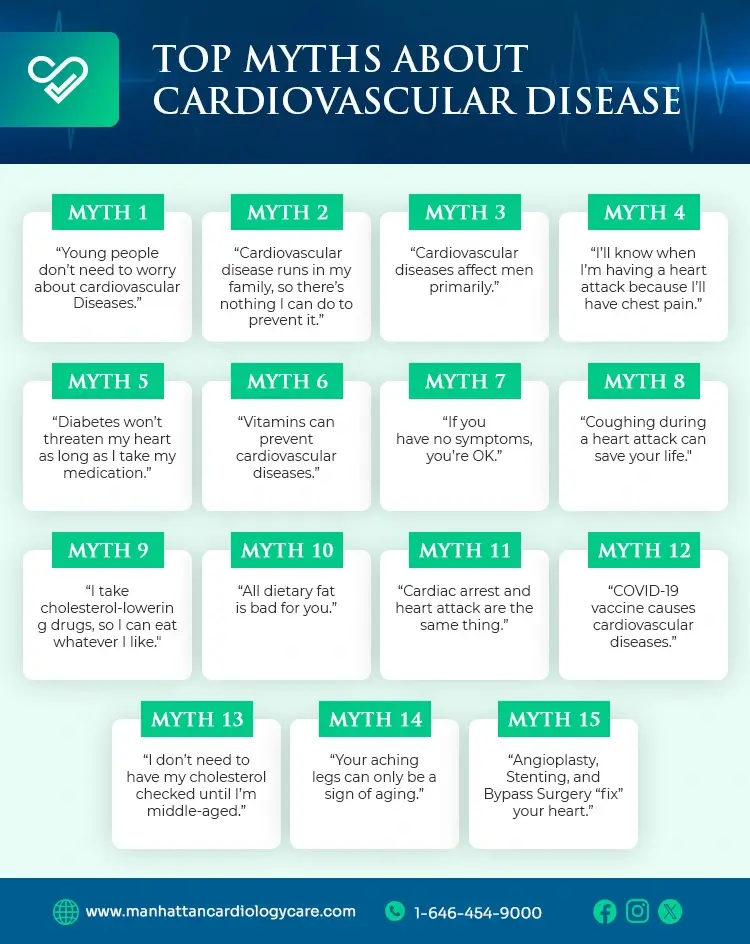Ever thought if your heart is silently whispering to you? Trying to tell you things that might go against and defy what you’ve known about your heart for so long.
When you come to think of it, how much of what you think you know about heart health is actually based on facts, and how much of it is just something you’ve just been hearing for a long time?
Well, buckle up! Because we are about to expose the myths about cardiovascular diseases, and spill the truth regarding some of the most common ideas about your heart health that you thought were actually true.
Are you ready to be surprised by what your heart has been trying to tell you? – Let’s begin!
Table of contents
Top Myths About Cardiovascular Disease
Myth 1: “Young people don’t need to worry about cardiovascular Diseases.”
Heart health is relevant at every age. Poor lifestyle habits in youth can contribute to heart issues later on. Establishing healthy habits early, like a balanced diet and regular exercise, lays a foundation for a strong heart.
Myth 2: “Cardiovascular disease runs in my family, so there’s nothing I can do to prevent it.”
While genetics play a role, lifestyle choices significantly influence heart health. Adopting a heart-healthy lifestyle—maintaining a balanced diet, exercising regularly, avoiding tobacco, and managing stress—can mitigate the genetic risk. Proactive measures can significantly reduce the likelihood of developing heart disease, even with a family history.
Myth 3: “Cardiovascular diseases affect men primarily.”
Let’s break the gender stereotype surrounding cardiovascular health. Heart disease is the leading cause of death for both men and women. While symptoms may manifest differently, the risk is comparable. Recognizing and addressing heart health is equally vital for all genders.
Myth 4: “I’ll know when I’m having a heart attack because I’ll have chest pain.”
While chest pain is a common symptom, heart attacks can manifest differently, especially in women. Symptoms may include shortness of breath, nausea, or pain in the jaw or back. Ignoring atypical symptoms delays seeking help. Recognizing a range of symptoms enables prompt response, increasing the chances of successful intervention and recovery.
Myth 5: “Diabetes won’t threaten my heart as long as I take my medication.”
Medication is part of diabetes management, but it’s not a standalone solution. People with diabetes need comprehensive care, including a heart-healthy lifestyle. Uncontrolled blood sugar levels contribute to cardiovascular risks. Combining medication with a balanced diet, regular exercise, and regular medical check-ups is essential for holistic heart health.
Myth 6: “Vitamins can prevent cardiovascular diseases.”
While vitamins play a role in overall health, they aren’t a cure-all for heart disease. A balanced diet rich in vitamins is beneficial, but it must be part of a broader heart-healthy lifestyle. Relying solely on vitamins neglects other crucial factors like exercise, a heart-friendly diet, and avoiding harmful habits like smoking.
Myth 7: “If you have no symptoms, you’re OK.”
Some heart conditions present no symptoms until they reach an advanced stage. Regular check-ups are essential for early detection. Conditions like high blood pressure and cholesterol can be silent threats. Don’t wait for symptoms; preventive care and screenings are crucial for maintaining heart health.
Myth 8: “Coughing during a heart attack can save your life.”
While coughing won’t “save” you, it might not hurt. However, relying on coughing as a primary response is risky. Immediate medical attention, like calling emergency services, is crucial during a heart attack. Coughing might provide temporary relief but doesn’t substitute professional intervention.
Myth 9: “I take cholesterol-lowering drugs, so I can eat whatever I like.”
Cholesterol-lowering drugs help manage levels but aren’t a license to indulge in an unhealthy diet. Medication complements a heart-healthy lifestyle, including a balanced diet and exercise. Relying solely on drugs without addressing lifestyle factors compromises long-term heart health.
Myth 10: “All dietary fat is bad for you.”
Not all fats are created equal. Healthy fats, like those in avocados and nuts, are essential for heart health. It’s saturated and trans fats found in processed foods that pose risks. A balanced approach to dietary fats, emphasizing healthy sources, contributes positively to heart health.
Myth 11: “Cardiac arrest and heart attack are the same thing.”
Contrary to popular belief, cardiac arrest and a heart attack are distinct events. A heart attack occurs when blood flow to a part of the heart is blocked, usually by a blood clot. On the other hand, cardiac arrest is a sudden loss of heart function, often caused by an electrical disturbance in the heart’s rhythm. While heart attacks can lead to cardiac arrest, they are not interchangeable terms. Immediate medical attention is crucial for both, but understanding the differences is vital for accurate response and prevention.
Myth 12: “COVID-19 vaccine causes cardiovascular diseases.”
Extensive research and real-world data have consistently shown that the benefits of COVID-19 vaccination far outweigh the risks. While extremely rare cases of heart inflammation (myocarditis and pericarditis) have been reported after vaccination, the risk is significantly lower than the potential heart complications associated with a COVID-19 infection itself. Vaccination remains a critical tool in preventing severe illness and protecting overall health.
Myth 13: “I don’t need to have my cholesterol checked until I’m middle-aged.”
Heart health is a lifelong journey, and monitoring cholesterol is a key aspect of prevention. High cholesterol can develop at any age, influenced by factors such as genetics and lifestyle. Early detection allows for timely intervention, potentially preventing long-term damage to the heart. Regular cholesterol checks, even in younger years, contribute to a proactive approach to heart health, enabling informed decisions about lifestyle and, if necessary, medical intervention.
Myth 14: “Your aching legs can only be a sign of aging.”
While it’s true that aging can bring about changes in the body, persistent leg pain should not be dismissed as a natural part of getting older. Leg discomfort could indicate various issues, including poor circulation or peripheral artery disease. Identifying the underlying cause, regardless of age, is crucial for effective management and preventing potential complications.
Myth 15: “Angioplasty, Stenting, and Bypass Surgery “fix” your heart.”
These interventions are indeed valuable tools in treating coronary artery disease, but they are not a cure. They alleviate symptoms and improve blood flow to the heart, but long-term heart health requires comprehensive lifestyle changes. A healthy diet, regular exercise, and ongoing medical management are crucial for sustained well-being. Procedures like angioplasty and stenting are interventions, not magic fixes.
Conclusion
To maintain a healthy heart, knowledge is your most important partner – the more you know, the better you can manage and respond to conditions.
At Cardiology Care, we’re dedicated to empowering you with accurate information and personalized care. Your heart matters, and so does your understanding of it. Trust in the facts, dispel the myths, and start a journey to heart health together.
Visit us for comprehensive cardiovascular care that goes beyond myths to provide the highest standard of medical expertise.
Disclaimer
This blog is for informational & educational purposes only, and does not intend to substitute any professional medical advice or consultation. For any health related concerns, please consult with your physician, or call 911.

